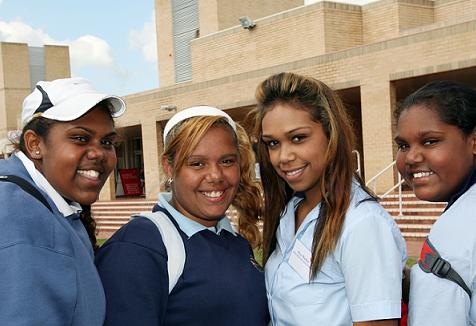Aboriginal Girls Circle

Last month, UWS researchers travelled to Dubbo as part of an ongoing investigation into the Aboriginal Girls’ Circle (AGC) project being run at Dubbo College.
The AGC aims to build a sense of connectedness by engaging the girls in projects they initiate within the community. During their recent visit, UWS researchers found the girls preparing to host a luncheon in support of their community’s disabled elders. The girls raised the funds for the event themselves.
Instigated by the National Association for the Prevention of Child Abuse and Neglect (NAPCAN) and Associate Professor Sue Roffey, the AGC is an adaptation of the successful Circle Solutions framework, which promotes principles of inclusion, respect, safety and positivity while teaching skills that aim to foster resilience and wellbeing.
Dr Brenda Dobia, who leads the research team, says a significant factor in promoting mental health and wellbeing is developing a sense of belonging and connectedness to school and community.
“We know that Aboriginal youth often face multiple risk factors, which impact significantly on their wellbeing and affect their engagement at school,” she says. “While the AGC project aims to promote the girls’ strengths and resilience by building supportive relationships and teaching social and emotional skills, it’s important to ensure that our research reflects the cultural values and needs of the Aboriginal community.”
The UWS research team, which includes both Aboriginal and non-Aboriginal researchers, began work by asking community members what they think contributes to growing strong girls and what they have experienced in the AGC. The next step in the research involves analysing data to determine key themes and incorporate them into the development of culturally appropriate frameworks and measures for furthering research in this field.
To find out more about the Aboriginal Girls Circle, view the research project summary(opens in a new window) (PDF, 78.3kb) online.
In addition to Dr Brenda Dobia, the research team includes Dr Gawaian Bodkin-Andrews, Dr Roberto Parada, Ms Virginia O’Rourke and Ms Annie Daley, with expert consultation from Ms Shirley Gilbert.
Mobile options:

